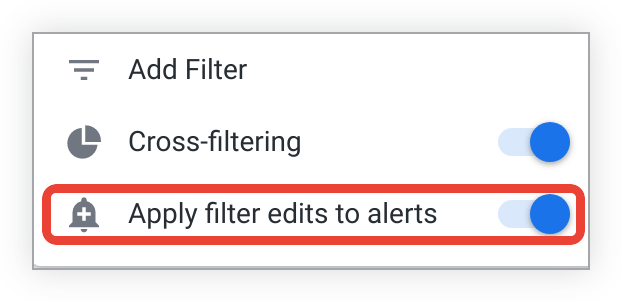如果您拥有适当的用户权限,则可以在用户定义的信息中心或 LookML 信息中心中,针对基于查询的图块或与 Look 关联的图块创建提醒。
每个提醒查询都会捕获创建提醒时的信息中心和功能块设置;不过,提醒会与您或其他用户对其底层信息中心或功能块所做的许多常见类型的更改同步,而无需重新创建提醒。本文档页面介绍了以下类型的仪表板更改如何影响提醒:
如需了解如何修改提醒查询,请参阅修改提醒文档页面。
修改信息中心或功能块
您或其他用户对提醒功能的功能块或信息中心所做的许多更改都会同步到提醒设置,而无需重新创建提醒。该提醒会捕获其信息中心功能块或功能块的信息中心过滤条件发生的一些变化。提醒可能还会根据其功能块的信息中心类型对更改做出不同的处理。
修改信息中心功能块
如果图块上至少有一个提醒,当您将鼠标悬停在信息中心图块的三点状菜单中的修改选项上时,Looker 会显示一条警告:
Editing may affect any alerts on this tile.

Looker 还会在修改功能块窗口中显示警告:
At least one alert is set on this dashboard tile. Editing the fields in this tile's visualization may invalidate the conditions for these alerts.

对信息中心功能块所做的许多更改都会应用于该功能块上的提醒。不过,某些更改可能会使提醒查询的预期含义失效,并破坏提醒与信息中心功能块之间的同步。请参阅本页中的表格,了解常见信息中心功能块更改的列表,以及这些更改对该功能块上的所有提醒有何影响。
修改用户定义的信息中心或 LookML 信息中心
此表会显示,对于用户对用户定义的信息中心 (UDD) 或 LookML 信息中心中的功能块查询所做的每项更改,提醒是否会保持同步。
| 信息中心功能块查询的变更 | 提醒是否仍会同步到信息中心? | 所有者解决方案 |
| 移除提醒查询中使用的维度或自定义维度 | 否 | 修改现有提醒条件。 |
| 添加或移除在提醒查询中未使用的维度或自定义维度 | 是 | |
移除提醒查询中使用的 type: time 维度 |
否 | 修改现有提醒条件。 |
| 添加测量或自定义测量 | 是 | |
| 移除提醒查询中未使用的维度、自定义维度、衡量标准、自定义衡量标准或表格计算 | 是 | |
| 移除提醒查询中使用的测量或自定义测量 | 否 | 修改现有提醒条件。 |
| 修改未在提醒查询中使用的现有表计算 | 是 | |
| 修改提醒查询中使用的现有表计算 | 是 | |
| 移除提醒查询中使用的表计算 | 否 | 修改现有提醒条件。 |
| 添加表计算 | 是 | |
| 从可视化图表中隐藏在提醒查询中未使用的维度 | 是 | |
| 从可视化图表中隐藏提醒查询中使用的维度 | 是 | |
| 从可视化图表中隐藏未在提醒查询中使用的测量值 | 是 | |
| 从可视化图表中隐藏提醒查询中使用的衡量标准 | 是 | 修改现有提醒条件。 |
| 更改可视化图表类型 | 是 | |
| 更改查询过滤条件 | 是 | 虽然更改会与提醒同步,但如果提醒的触发器值超出了更新后的查询过滤条件所指定的数据值,则提醒可能会失效。您可能需要修改提醒触发器值,以考虑新的一组数据值。 |
| 更改排序顺序 | 是 | 修改提醒触发器值,以反映新的一组数据值。 |
| 更改数据透视(取消数据透视、基于其他字段进行数据透视) | 是 | 虽然这些更改会与提醒同步,但如果提醒的触发器值超出了更新后的数据透视表所规定的数据值范围,则提醒可能会失效。您可能需要修改提醒触发器值,以考虑新的一组数据值。 |
| 更改列数上限 | 是 | 虽然这些更改会与提醒同步,但如果提醒的触发器值超出了更新后的列数限制所规定的数据值范围,则提醒可能会失效。您可能需要修改提醒触发器值,以考虑新的一组数据值。 |
| 更改行数上限 | 是 | 虽然这些更改会与提醒同步,但如果提醒的触发器值超出了更新后的行数上限所规定的数据值,则提醒可能会失效。您可能需要修改提醒触发器值,以考虑新的一组数据值。 |
| 添加或移除小计 | 是 | |
| 添加或移除列总计或行总计 | 是 | |
| 填充缺失的日期和值 | 是 | 虽然更改会与提醒同步,但如果缺少值的字段是时间范围,则填写这些值可能会影响功能块查询结果。您可能需要修改提醒触发器值,以考虑新的一组数据值。 |
| 重新排列字段 | 是 | 虽然更改会与提醒同步,但如果查询存在行或列限制,更改功能块查询中的字段顺序可能会影响查询结果。您可能需要修改提醒触发器值,以考虑新的一组数据值。 |
重新排列 type: time 或自定义维度的维度 |
是 | 例外情况:如果第一个时间维度不同于设置提醒的时间维度,则提醒会失去同步。 |
修改 LookML 信息中心
下表介绍了仅对 LookML 信息中心所做的更改如何影响这些图块上的所有提醒。
| 对 LookML 信息中心功能块查询所做的更改 | 提醒是否仍会同步到信息中心? | 所有者解决方案 |
更改 explore 或 model 参数(但保留相同的 LookML 信息中心 ID,即 model::dashboardname) |
否 |
|
修改信息中心过滤条件
对于用户定义的信息中心,您可以选择是否将对信息中心过滤条件所做的更改同步到信息中心中的所有提醒,也可以选择不同步任何信息中心过滤条件更改。您无法选择性地将对信息中心过滤条件所做的更改应用于各个信息中心图块上的提醒。
如需将信息中心过滤条件更改与信息中心中的所有提醒同步,请执行以下操作:
Looker 不会尝试根据对 LookML 信息中心过滤条件所做的更改来同步提醒。
下表介绍了仅对用户定义的 Dashboard 所做的更改对这些图块上的所有提醒有何影响。
| 对 UDD 永久性过滤条件的更改(已启用提醒切换开关) | 提醒是否仍会同步到信息中心? | 用户解决方案 |
| 添加或移除信息中心过滤条件 | 是 | 虽然更改会与提醒同步,但更新信息中心过滤条件可能会影响查询结果。您可能需要修改提醒触发器值,以考虑新的一组数据值。 |
| 修改信息中心过滤条件的默认值 | 是 | 虽然更改会与提醒同步,但更新信息中心过滤条件可能会影响查询结果。您可能需要修改提醒触发器值,以考虑新的一组数据值。 |
| 修改信息中心过滤条件的临时值 | 否 | 虽然更改会与提醒同步,但更新信息中心过滤条件可能会影响查询结果。您可能需要修改提醒触发器值,以考虑新的一组数据值。 |
| 修改信息中心过滤条件应用到的字段 | 是 | 虽然更改会与提醒同步,但更新信息中心过滤条件可能会影响查询结果。您可能需要修改提醒触发器值,以考虑新的一组数据值。 |
复制信息中心
复制信息中心不会复制该信息中心中的任何增强型提醒。
删除信息中心
删除信息中心后,该信息中心中的所有提醒都会立即停用。满足提醒条件后,任何关注者或收件人将不再收到通知。
提醒所有者会立即在管理提醒用户页面上看到相应提醒的信息中心名称已被删除。下次运行提醒查询后,提醒状态将显示为已停用。
检查提醒的同步状态
您可以在管理提醒用户页面上的提醒详情页面查看提醒的同步状态。如果您是 Looker 管理员,还可以在提醒管理页面中访问提醒详情页面。
同步状态显示在页面左下角:
- 带有绿色圆圈对勾标记表示提醒仍会同步到其信息中心。
- 黄色三角形警告符号表示提醒已与信息中心中的信息不同步。该状态包含同步中断时的时间戳。未同步的提醒会在管理提醒用户页面或提醒管理页面的信息中心列中显示“无”值。
解决未同步的提醒
即使某个提醒与其信息中心不同步,Looker 仍会继续运行提醒查询,以检查信息中心功能块数据是否符合提醒条件。这些查询的结果会显示在提醒的记录中,您可以在提醒所有者和管理员的提醒管理页面上的提醒详情页面,以及提醒记录管理页面上查看这些结果。不过,根据同步中断的原因,系统可能无法满足提醒条件。
如果您拥有的提醒与其信息中心未同步,您可能需要执行以下操作来解决此问题:
- 修改原始提醒条件
- 修改原始提醒阈值
- 重新创建功能块的原始查询和任何所需的过滤条件
如需修改提醒,请参阅修改提醒文档页面。
如需重新创建功能块查询,请执行以下操作:
- 在提醒详情页面上的可视化图表三点状菜单中,点击从这里开始探索选项。
- 重新创建原始查询。
- 点击“探索”齿轮图标,然后依次选择齿轮菜单中的保存和子菜单中的保存到现有信息中心,以将查询添加到相应信息中心。
- 在信息中心内,根据需要对功能块应用信息中心过滤条件。
- 在该信息中心图块上设置新提醒。


